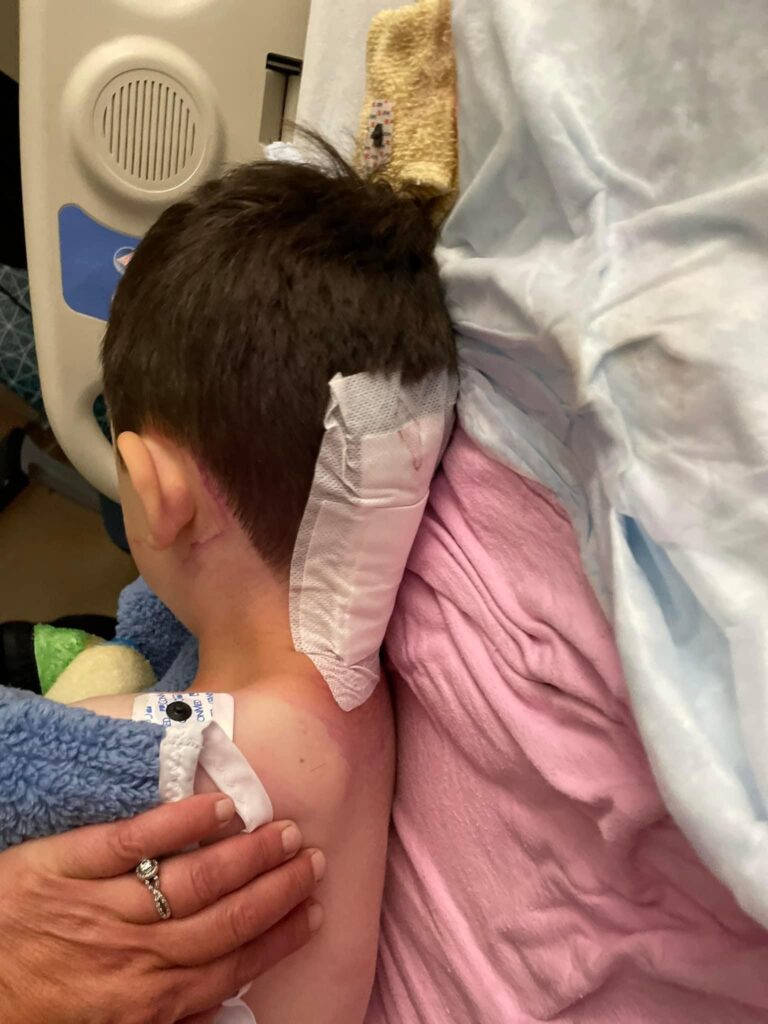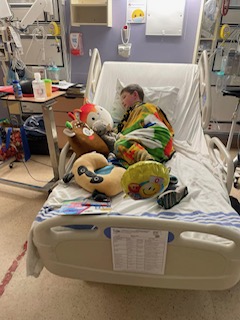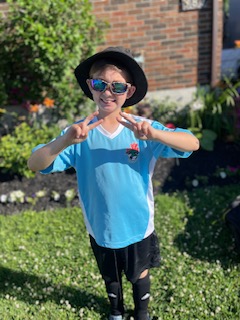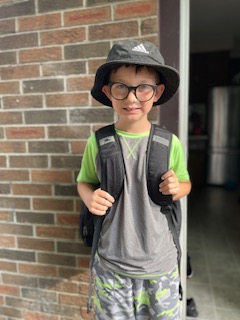Austin’s Story
Chiari Malformation is a congenital defect in the lower back of the head where the brain and spinal cord connect. The brain tissue extends into the spinal canal, putting pressure on the brain that can cause symptoms such as headaches, decreased strength in the arms and hands, neck pain and other health problems. The severity and impact of symptoms will vary for individuals with Chiari Malformation, thus making diagnosis and treatment difficult to determine until after the onset of specific signs and symptoms.
Eight-year-old Austin, the youngest of Michelle’s three children, was born one month premature but overall healthy except for having clubfoot that would require reconstructive foot surgery at seven months of age. When his cast was removed eight weeks after the surgery, he would not use his right leg and began to show right-sided weakness, alerting his parents that something was awry. His parents, Michelle and Matthias, continued to seek medical help in search of a diagnosis despite being told by doctors that he did not meet the criteria for a Chiari Malformation or Tethered Cord Syndrome diagnosis.

After months of appointments at Grandview Kids for bracing, casting and post-surgery rehab treatments, Austin’s physiotherapist, Winnie, went above and beyond her duty as she advocated for the family and sent a referral to Sick Kids Hospital for further investigation. During physiotherapy sessions, she noticed that Austin’s case needed to be looked at differently as the underlying cause seemed not to be muscular but neurological. After completing a number of MRIs and seeing symptoms worsen, Austin was finally diagnosed with Chiari Malformation at age one.
Treatment for Chiari Malformation is determined based on the severity and state of progressiveness of the illness. Austin’s first seven years of life would be spent at endless appointments at many of Sick Kids’ clinics, including their Pain, Neurology and Neurosurgery Clinics, and working hard during physiotherapy (PT) and occupational therapy (OT). He could not walk for more than 15 minutes at a time, required the use of a stroller at school, was quickly drained of energy and had neurological damage to his right hand and pelvic floor due to Chiari Malformation.


Austin’s parents continued to fight for further medical intervention due to his poor quality of life. On June 05, 2023, Austin finally received his life-changing Chiari Malformation Decompression Surgery. His abnormally enlarged tonsils were removed along with two inches of his skull and C1 and C2 of his vertebrae. Since his surgery, Austin’s quality of life has improved exponentially. Once too exhausted to participate in extra-curricular activities, he is now on the soccer team, has found a love for running track and swimming, rides a bike, and does it all in a way that exceeds doctors’ expectations.


Although Austin still has difficulty keeping up with his peers due to his fragility, tremors, right-sided weakness and right-hand nerve damage, his tenacity is palpable. “I don’t quit,” is Austin’s motto. He pushes himself in PT and OT without complaint, aiming to get stronger. Michelle believes that his fierce determination is shaped by having always involved him in his care. From reviewing brain MRI images to reading medical books geared for kids and watching videos on procedures that he will have done, “We made it normal language in our house… because we are a team,” Michelle states.
Austin has taught his family how to persevere, remain positive through the negative and always fight to be the best version of ourselves. Michelle shares Austin’s story because “being a medical mama is a lonely world,’ and she does not want anyone to feel alone as she did. She hopes that her story encourages and empowers other families to be their own champions, knowing that individual stories matter and that, collectively, these powerful stories can make meaningful changes for future generations.
Check out more Grandview Kids articles
- June: Dates of Significance
- Acknowledging holidays and celebrations in June
- Colton’s Story: Dravet Syndrome Awareness Day
- Rudra’s Journey: Arthrogryposis Awareness Day
- Nick Story: Spina Bifida Awareness Month
